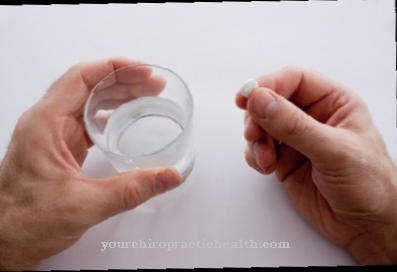The preparation Alcuronium chloride is used to relax the muscles. The preparation is mainly used to temporarily paralyze the skeletal muscles before operations in the chest and abdomen, so that the surgeon has a better view of the surgical area. Because the administration of the preparation can rarely lead to severe anaphylactic reactions, it may only be administered by experienced emergency doctors and anesthetists who can react appropriately to an undesirable reaction in the patient's body.
What is Alcuronium Chloride?

Alcuronium chloride is one of the so-called muscle relaxers. These are preparations that cause the skeletal muscles to relax. The active ingredient alcuronium chloride is one of the peripheral muscle relaxants.
These block the transmission of stimuli to the motor end plates of the muscles and thus produce a reversible paralysis of the muscles. Alcuronium chloride is a semi-synthetic derivative that is obtained from the alcohol toxiferin.
This substance is a crystalline powder that is both odorless and colorless. Alcuronium chloride can be dissolved in water, ethanol and methanol. The preparation is administered before operations to alleviate those post-operative symptoms that are reminiscent of sore muscles.
Pharmacological effect
Like all slack muscles, Alcuronium chloride also relaxes the skeletal muscles. This active ingredient acts on the motor end plate of the respective muscle, i.e. where excitation impulses are transmitted from nerve cells to the corresponding muscle. This causes reversible paralysis that the organism can overcome independently.
How long the paralysis lasts depends on the dosage of the active ingredient. The blockage of the transmission of stimuli works as follows: As soon as the nerve cell is excited, it releases the messenger substance acetylcholine, which reaches the receptors on the muscle cell via the synaptic gap. The messenger substance triggers a reaction in the muscle cell, which usually contracts.
Preparations like alcuronium chloride do not prevent the release of the messenger substance, but they do prevent the reaction in the muscle cell. This paralyzes the muscle cell and prevents active movement. This effect occurs relatively quickly in the patient and has a comparatively short duration. The reason: The temporary paralysis of the muscles is overcome by the organism.
Medical application & use
The active ingredient alcuronium chloride is generally administered when the aim is to relax the muscles. Alcuronium chloride and similar preparations are preferably administered during operations in the chest or abdomen.
This weakens the movement of the muscles to ensure a better view of the surgical area. Muscle relaxants such as alcuronium chloride are also administered for various pathological states of spasms or poisoning. This prevents the muscles from overstretching and causing severe muscle soreness. If the patient is being treated with electric shocks, the administration of muscle relaxants can prevent muscle and tendon tears.
Because alcuronium chloride is difficult to break down from tissues and the gastrointestinal tract, the preparation is only administered intravenously. The active ingredient cannot be integrated into the human metabolism and is therefore largely broken down in the kidneys. Only a small part of about five percent can be detected in the bile after administration.
You can find your medication here
➔ Medicines for muscle painRisks & side effects
Frequently occurring side effects cannot be observed with the active ingredient alcuronium chloride, but they can still occur. Occasionally, the following side effects can be observed: bronchospasm (this is the cramping of the muscles around the airways), cardiac arrhythmias and allergic reactions.
Occasionally, there can also be various complaints in the digestive tract. These side effects can show up individually or in combination. In rare cases, a drop in blood pressure combined with an accelerated pulse may occur. Various anaphylactic reactions are also observed in rare cases.
These are reactions of the immune system that can affect the whole body. The spectrum of these reactions ranges from mild skin reactions to circulatory shock. For this reason, Alcuronium chloride should only be administered by experienced emergency doctors or anesthetists.



























